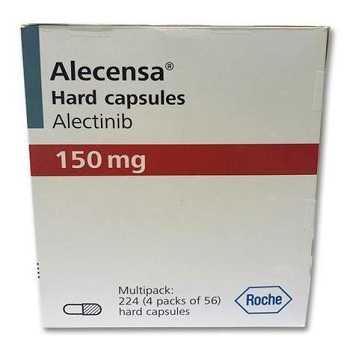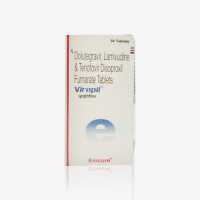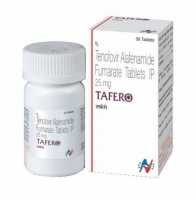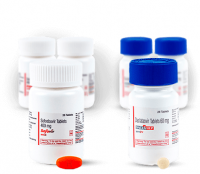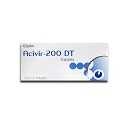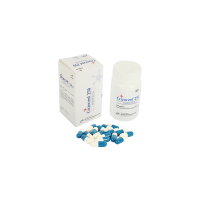Alecensa 150mg (Alectinib)
Courier service EMS
Other transport services
Air India Post International
Payment in the bank on the invoice
WestrUnion
MoneyGram
ALECENSA 150MG
Description
Alecensa 150mg belongsto an antineoplastic targeted therapy. It is classified as a tyrosine kinase inhibitor anaplastic lymphoma kinase (ALK) gene mutation.
Alecensa 150mg blocks certain proteins made by the ALK gene.
Alecensa 150mg is a prescription drug which is used under the supervision of medical oncologist.
Indication
Alecensa 150mg is used for the treatment of anaplastic lymphoma kinase (ALK)-positive metastatic non-small cell lung cancer (NSCLC).
Mechanism of action
Alectinib belongs tosecond-generation oral drug which selectively prevents the activity of anaplastic lymphoma kinase (ALK) tyrosine kinase. It is essentially used in the treatment of non-small cell lung cancer (NSCLC) expressing the ALK-EML4 (echinoderm microtubule-associated protein-like 4) fusion protein that causes proliferation of NSCLC cells. prohibition of ALK blocks phosphorylation and subsequent downstream activation of STAT3 and AKT leads in decreased tumour cell viability. Both Alectinib and its major active metabolite M4 demonstrate same in vivo and in vitro activity against multiple mutant forms of ALK.
ADME Properties
Absorption: maximum plasma concentration 4 hours and bioavailability of Alecensa 37%
Distribution: Alectinib has plasma proteins binding is 99%
Metabolism: Metabolized by CYP3A4 to its major active metabolite M4, the main circulating moieties in plasma, total radioactivity 76% constituting.
Elimination: In oral administration, radioactivity 98% was excreted in feces. 84% dose was excreted in the feces unchanged Alectinib.
Half-life is 33 hours
Dosage and administration
Non- Small Cell Lung Cancer
The recommended dose is 600mg PO BID until disease progression or unacceptable
Renal impairment patients dose is 450mg orally twice daily
Alecensa is administrated with food
Side effects
Alecensa causes some side effects while administrating certain condition as follows
COMMON SIDE EFFECTS
Muscle pain
Bradycardia
Tiredness
Constipation
Anemia
Hepatotoxicity
Trouble breathing
Shortness of breath
Cough
Fever
Drug interaction
No pharmacokinetic interactions with Alecensa 150mg needed dosage adjustment have been observed.
Contraindication
None
Precautions
Embryo-fetal toxicity
Based on data from animal studies and its mechanism of action, Alecensa can cause fetal harm when administered to pregnant women.
When administration of Alecensa, Symptomatic bradycardia may have resulted; control heart rate and blood pressure regularly.
Alecensa may causes serious myalgia and elevated CPK resulted; advise patients to report any unexplained muscle pain, tenderness, or weakness;
Renal impairment occurred during Alecensa treatment; incidence of Grade ≥3 renal impairment was 1.7%, of which 0.5% were fatal events.
Pregnancy
Based on studies of animal and mechanism of action, Alecensa 150mg will cause fetal harm when given to pregnant women
Advice the female not to become pregnant while on treatment with Alecensa
Lactation
During treatment with Alecensa, advise the women not to breastfed to infants
Storage
Store at below 300C
Keep the drug in its original container
Missed dose
If the patient forgets totake a dose of ALECENSA, then should not to take an extra dose, but before taking the next dose, have the missed dose at the regular time, skip the missed dose.
- Trade name Alecensa 150mg
- Substance Alectinib
- Manufacturer Genentech Inc
- Packaging 224 tablets
- Country of origin India
-
Convenient deliveryWe deliver to all countries of the World *. We cooperate only with trusted cargo carriers.
-
CONTROL AND INSPECTIONItem is checked before shipping! All the medicines are delivered directly from the manufacturer and sent from India to the client's address.
-
CHOOSE USWe provide the best price, including insurance against loss through the fault of the carrier. Our company cooperates directly with the largest manufacturers of medicines in India.
-
Promotions and DiscountsWe offer a flexible system of discounts for our customers and fixed discounts for current offers. Regular customers receive a discount of up to 10% of the amount of orders, as well as a remuneration system for referring customers via a referral link.

